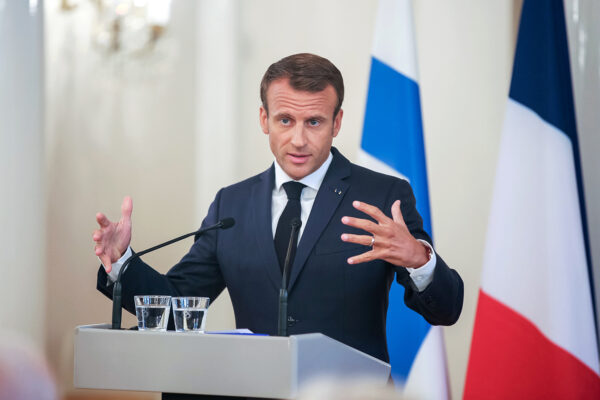
Emmanuel Macron is projected to place first in the opening round of the French presidential election in two weeks, which would make him the favorite for the runoff another two weeks later.
Macron has been in power since 2017 and is only the second of eight presidents who didn’t come from the Gaullist right or the Socialist left. “Liberal” is a dirty word in France, synonymous with Anglo-American capitalism, so Macron calls himself a “centrist” and a “progressive”. But he has governed as a liberal.
Here is an overview of his successes and failures.
Successes
- Spent nearly half a trillion euros on furloughs, subsidies and tax breaks to cushion the economic effects of the COVID-19 pandemic.
- Made it easier for firms to hire and fire workers.
- Reduced severance pay.
France had among the strictest labor laws in the world, which contributed to high structural unemployment. Firms were reluctant to hire. After Macron’s reforms, unemployment fell from 10 to 8 percent.
- Penalized companies that made excessive use of short-term contracts.
- Extended public unemployment insurance to freelancers.
- Reined in labor migration from Eastern Europe to protect low-skilled workers in France.
- Abolished a wealth tax few millionaires paid.
- Extended welfare to one million more households.
- Made dental services, eyeglasses and hearing aids free.
93 percent of the French saw 1.6 percent after-tax income growth prior to the pandemic.
- Allowed buses to compete with rail.
- Eased regulations on small and medium-sized businesses.
- Ended automatic pay rises and early retirement at the state railway.
Trains used to have a monopoly on intercity transport.
Before the pandemic, business creation was up 60 percent. France had overtaken Germany and the United Kingdom as the top destination of foreign investment in Europe.
- Hired 10,000 cops.
- Conditioned state funding for religious institutions on their support of republican values, including the separation of church and state.
- Tightened laws against online hate speech.
- Tightened regulation of homeschooling.
These measures are part of a deradicalization agenda. Macron was elected on the heels of the 2015 Paris and 2016 Nice terrorist attacks, which were the deadliest in French history. His presidency saw several bomb plots, stabbings and even beheadings by young Muslim men. Emigration of French Jews to Israel increased.
- Brought in the highest share of women lawmakers yet.
- Banned lawmakers from hiring relatives or spending public money without providing invoices.
In the most notorious case, François Fillon, one of Macron’s opponents in the 2017 election — he now works for a Russian petrochemical company — was convicted of fraud and misuse of public funds for giving his wife a fake job.
- Canceled the Grand Ouest Airport, which would have replaced the Nantes Atlantique Airport.
- Approved the construction of fourteen nuclear power plants by 2050.
France has 56 nuclear reactors, which generate 70 percent of its electricity. The fourteen additional plants should almost entirely free France of fossil fuels.
- Blocked EU accession talks with Albania and North Macedonia.
- Convinced the European Commission to levy an EU carbon frontier tax.
- Vetoed an EU trade deal with Mercosur, arguing South American countries must do more to stop the deforestation of the Amazon.
I think blocking the trade deal was a mistake, and that it was not a coincidence French farmers feared competition from South American beef, but in France it was considered a victory.
Failures
- Industry has continued to decline as a share of economic output and employment, and France’s trade deficit has continued to widen.
- Macron’s rise in gasoline tax, to shift the French into electric cars and public transport, provoked the reactionary, Yellow Vests riots.
- He subsequently organized “grand debates” across France to hear out people’s concerns, which were hailed as a form of participatory democracy, but little was done with the conclusions.
- Macron’s calls for harmonizing business taxes and wages in Europe, a eurozone budget, a European asylum office and a European Climate Bank fell on deaf ears in Berlin and Brussels.
- Even with Germany’s support, Macron failed to persuade the European Commission to relax EU competition rules to allow big mergers and state aid
- Macron recognized that France has let down its ethnic minorities by confining them to suburban ghettos. He promised new policies for the banlieues. They are still waiting. (This doesn’t help the deradicalization agenda either, which is heavy on repression and light on prevention.
Mixed
- I hesitate to write up the lack of pension reform as a failure. If COVID hadn’t happened, Macron could have pushed it through. Signs are he will in a second term. I explain here why reform is needed.
- European defense integration, favored by Macron, is happening, but slowly. It was the Ukraine War, not Macron, that convinced member states to make serious work of it. More here.
- The Conference on the Future of Europe, Macron’s brainchild, is ongoing, so it wouldn’t be fair to call it either a success or failure yet. Modeled on the “grand debates”, the idea to get ordinary Europeans involved in drafting EU policies. The trouble is that few Euroskeptics participate, so the end result could be an unrepresentative call for “more Europe” in every domain that will then be claimed as a mandate by the Europhile majority in the European Parliament — who will then again be surprised in the next European election, when one in five Europeans vote for anti-EU parties. But who knows? Maybe I’m pessimistic and the conference will help make the EU’s institutions more responsive to voters.
